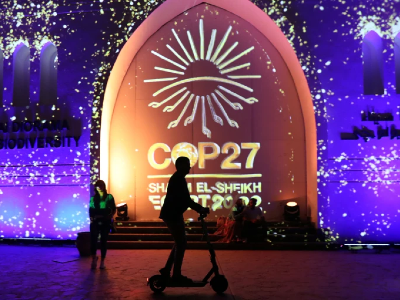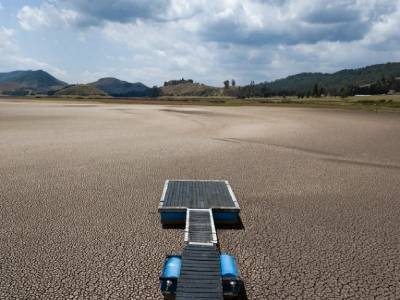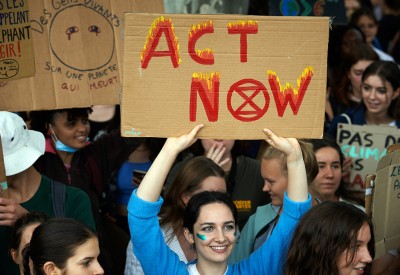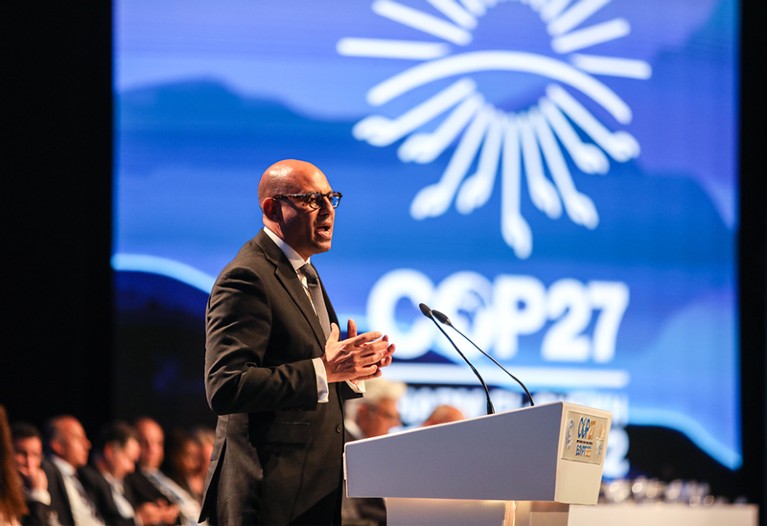
United Nations climate change executive secretary Simon Stiell speaks during the closing session of COP27.Credit: Mohamed Abdel Hamid/Anadolu Agency/Getty
The 27th United Nations climate conference (COP27) ended on Sunday morning with researchers largely frustrated at the lack of any ambition to phase out fossil fuels.
However, there was one silver lining: delegates from low and middle income countries (LMICs) came away with an agreement on a new ‘loss and damage’ fund to help them cover the costs of climate-change impacts.
The final 10-page summary text, which was agreed on 20 November, says that limiting global warming to 1.5 °C above pre-industrial levels requires “rapid, deep and sustained reductions in greenhouse gas emissions” by 2030.
But calls to phase out fossil fuels were blocked by oil-producing states, and some delegates struggled to find reasons to be cheerful at the glacial pace of decarbonization. Many blamed the energy crisis sparked by Russia’s invasion of Ukraine for a lack of progress on fossil fuels.
‘Actions, not just words’: Egypt’s climate scientists share COP27 hopes
“It’s clear that the window for 1.5 is closing fast,” says Chukwumerije Okerere, who studies climate governance at the Alex Ekwueme Federal University Ndufu-Alike Nigeria. According to some, it might not be possible to keep this goal “unless there is massive carbon dioxide removal on an unprecedented scale”, he adds.
A record 45,000 people registered to attend COP27, leading some to question whether such a format is appropriate to tackling a planetary emergency. “The negotiations that are happening are completely devoid of reality,” says Sunita Narain, director-general of the Centre for Science and Environment, an environment research organization in New Delhi, India.
Although there is value in bringing people together to share ideas and build momentum, she fears that the core purpose of the meeting — to push world leaders to commit to stronger actions and hold them accountable — has been lost. “I have never seen anything like this. We’ve reduced the whole thing into a grand spectacle,” she says.
Researchers and activists attending the talks for the first time described disbelief as government negotiators spent days going back-and-forth over single words in the text.
“I am just, quite simply shocked about the [negotiating] process I have seen,” says Blutus Mbambi from the Centre for Climate Change Action and Advocacy in Lusaka, Zambia. “But we will keep on advocating. We will keep on pushing.”
The fight for finance
Representatives from low and middle income countries (LMICs) and China were quietly confident that COP27 would lead to the creation of a new loss-and-damage climate fund when this was added to the agenda at the start of the conference.
The fund would support countries suffering from the effects of climate change, such as Somalia, where more than 7 million people are facing hunger from an ongoing drought; or Pakistan, where floods this year caused around $30 billion worth of damage.
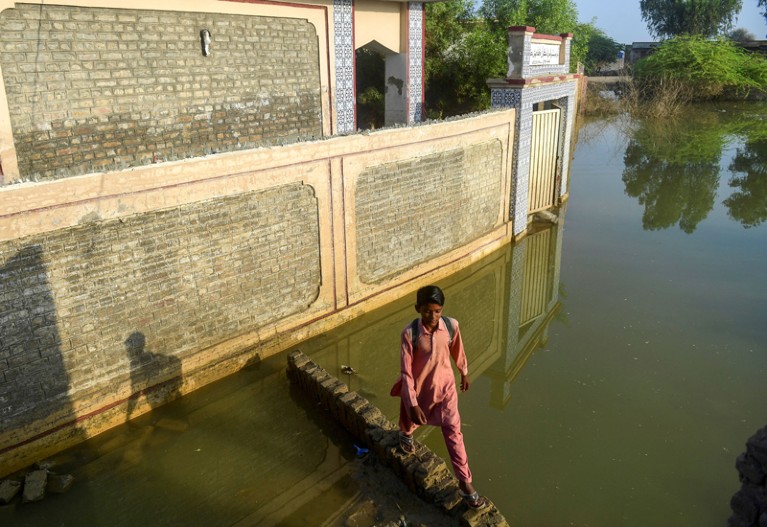
Earlier this year, severe flooding left around a third of Pakistan underwater and displaced millions of people.Credit: Asif Hassan/AFP/Getty
US climate envoy John Kerry arrived at COP27 opposing such a fund, and claimed that existing funds could pay for climate-related losses and damages. US negotiators also opposed the principle that high emitters should accept liability for their historical emissions, fearing this could lead to claims running potentially into trillions of dollars.
The European Union was also sceptical initially, but eventually changed its position, which put pressure on the US to follow. The fine print — including how much will go into the fund and who will contribute — will have to be discussed at next year’s conference.
In a first for a climate COP, the final text also backs reform of giant lenders such as the International Monetary Fund and the World Bank, which are lynchpins of the global economy. The IMF has $1 trillion available to lend to countries in financial distress, but only a small fraction of this is climate finance. The COP’s endorsement of reform is significant, says Sarah Colenbrander, who studies climate finance at the Overseas Development Institute, a think tank in London. That’s because it comes from countries who are also shareholders in these institutions, and can make change happen.
Energy crisis impact
The energy crisis sparked by Russia’s invasion of Ukraine loomed large during the discussions. High natural gas prices have reshaped global energy markets and pushed some wealthy European countries to temporarily fall back on coal while looking abroad for new sources of natural gas.
Climate change is costing trillions — and low-income countries are paying the price
Although the negotiations received a boost from a separate deal announced at the G20 summit in Bali, Indonesia, in which wealthy countries agreed to provide $20 billion to help Indonesia wean itself off coal, much of the attention at COP27 was on the European rush for natural gas.
Germany has signed a deal with Egypt to advance green hydrogen as well as liquified natural gas exports, while other governments and companies are courting projects in countries such as Senegal, Tanzania and Algeria.
European leaders insist these measures are short-term fixes that won’t detract from their long-term commitments, but the optics are very bad, says Narain. Before the crisis, the rhetoric from the developed world was that nobody was going to fund fossil fuel projects in developing countries, she says. “But now everybody is asking us to increase supply.”
These tensions had tangible impacts on the negotiations at COP27. Language calling for a phase out of fossil fuels was jettisoned from the final text, while new wording was added calling for accelerated development of “low-emission” energy systems, which many fear will be used to justify further natural gas development.
The failure to rein in fossil-fuel interests could also undermine the success on loss and damage negotiations, says Joab Okanda, senior Africa advisor for the advocacy organization Christian Aid, based in Nairobi, Kenya. “More fossil fuels means more loss and damage.”
Mohamed Salem Nashwan, who studies construction engineering at the Arab Academy of Science, Technology and Maritime Transport in Cairo, is not confident that there will be much progress on fossil fuels at COP28, which is due to be held in Dubai next year. “The host is heavily linked to the fossil fuel industries,” he says.
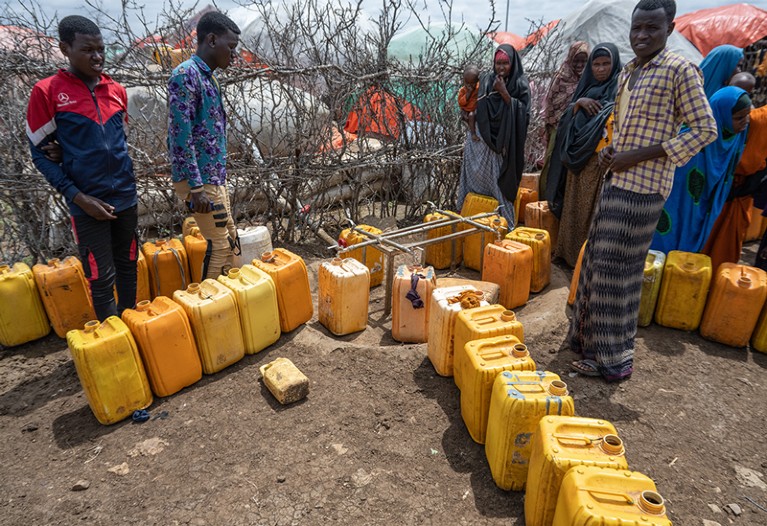
The COP27 agreement mentioned the importance of protecting food and water supplies.Credit: Scott Peterson/Getty
Food focus
The COP27 deal also says that “safeguarding food security and ending hunger” is a fundamental priority, and that communities can better protect themselves from climate effects if water systems are protected and conserved. By contrast, last year’s Glasgow Climate Pact made no mention of agriculture, food or water.
“There is real progress in terms of words,” says Joachim von Braun, an agricultural economist at Bonn University in Germany.
The new additions are welcome, says Claudia Sadoff, executive director of CGIAR, the global network of agricultural research centres, but she adds that “the text on the food crisis is not supported by [government] actions that need to be taken”.
COP27 climate summit: what scientists are watching
COP27 saw little by way of new dedicated funding for food systems from governments. By contrast, the Bill and Melinda Gates foundation pledged to spend US$1.4 billion over four years to help small-holder farmers address the immediate and long term impacts of climate change. “Every moment the world delays action, more people suffer, and the solutions become more complex and costly,” the foundation’s chief executive Mark Suzman said in a statement.
Absent from the text is any reference to the IPCC’s estimate that food systems are responsible for between 21% and 37% of global emissions. “The opportunities for ‘carbon farming’ and land use change to make a contribution to [climate] mitigation are ignored,” says von Braun.


